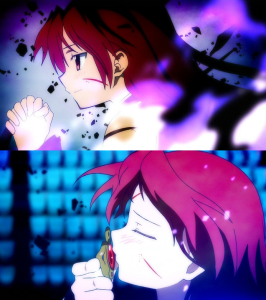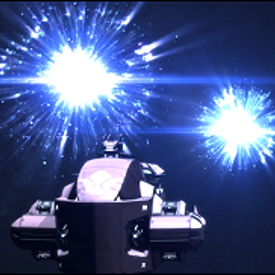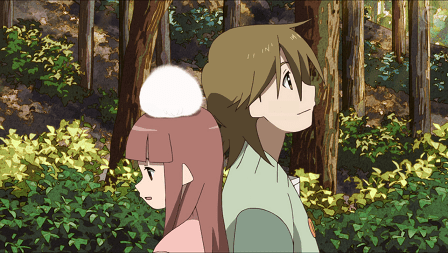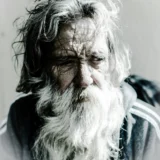The Fallen Magical Girl is a trope as endemic to the mahou shoujo genre as the transformation sequence. Though she once swore fealty to ideals of love and justice, now she obeys only herself, or perhaps the whims of some dark master. Her altruism has been gouged out, her idealistic nature soured. She is bitter and blames the callous nature of the world. She may rely upon the clarity of conquest to guide her, as Galaxia does in Sailor Moon. She may be quick to leave behind “losers” or “weaklings,” as Kyouko is in Puella Magi Madoka Magica. She may seem utterly trampled by circumstance and given over to her fate, like Anthy in Revolutionary Girl Utena. And though she may struggle against this destiny, as Princess Kraehe does in Princess Tutu, she lives in fear that her efforts are for naught.
In this way, the Fallen Magical Girl emblematizes the cynical cocoon of adolescence. This is often a comical phase, with its pantomime of wise adulthood; you’re absolutely certain you’ve figured out the world because you read the Wikipedia article on existentialism and you own a Dead Kennedys album. But it’s also terrifying. You look in the mirror and see someone too fat, too short, too greasy-faced and too hairy, someone you’re not sure anyone else will ever look upon approvingly. You lose your friends and perhaps no new ones rush in to fill the void—you become that kid, sitting alone at the lunch table, staring determinedly into the plastic wood grain. Maybe you become depressed or anxious and you feel like some terrible pall has been pulled over your world that no one else can see, that might never, ever leave. And the person who lived within your body a few scant years prior feels so far away, so utterly lost; they wave dimly to you across a chasm you don’t remember crossing.
Mahou shoujo stories are always about the coming-of-age and the Fallen Magical Girl is their adolescent intermission. Our heroines are lost to us, torn from their idyllic careers as freedom fighters in pastel dresses as we are torn from the childhood we understood. Galaxia, we learn, awoke as a sailor senshi on a planet she describes as “hellish”—in revolt, she conquers a wide swath of the universe, trying to prove to all creation that she is worth something. Kyouko has emerged from her father’s drunken murder-suicide of the entire family as a selfish, distrustful drifter. Anthy lives, passively and uncomplaining, in a fog of abuse and outright torture. Princess Kraehe vacillates madly between the fate her monstrous father has set for her and the love she finds herself unable to communicate to her prince. Notions of peace and justice have been brutally stripped from them and they exist in an ether of discontent and loneliness—feelings that often manifest in sinister ways. The world has abandoned them, so they will abandon the world.

They’re scared. And at that age, so are we. My teenage years are something I honestly find myself unable to think about for long periods of time because it just makes me too sad. It’s too harsh, too lonely, too confusing an age. Everything seems to be happening too fast and too slowly all at once and the tools you once used to understand the world are useless now. You’re lost. And like our scarred heroines, we find different ways to cope. Maybe we wrap ourselves up in that mantle of darkness, or we pretend to not care that we walk home alone, or we decide to control some aspect of our lives as rigidly as we can, or maybe we just flail wildly between emotions, desperate to get out of this alive. We’ve lost our power and we don’t know how to get it back.
But the Fallen Magical Girl always finds redemption, hope and purpose at the end of her journey. Moments before death, Galaxia realizes that the type of power she sought was worthless compared to the strength Usagi draws from being “a senshi who loves all.” Kyouko sacrifices herself to comfort another girl brutalized by the betrayal of her ideals (and in the final, Madoka-altered timeline, lives to fight another day). Anthy breaks free of her brother’s thrall and leaves Ohtori Academy altogether to embark on an adventure of her own. Princess Kraehe takes her place in the fairy tale she was always meant to reign over. Their heroism never left them—it was merely obscured.
The Fallen Magical Girl rises from the ashes of her disillusionment to discover that the world never did change that much—she did. But then again, she finds that her old childhood passion for truth, love, and justice aren’t so out of place after all. She learns to adjust, to discover new strengths and drives. She determines who she wants to be, then develops the tools to go out there and become that person. She has been tempered by the brutal crucible of adolescence into someone wiser and braver, someone who will illuminate the world with love in ways she could never have imagined prior. Her life blooms with sudden possibility. She is victorious, for she has conquered herself. The rest is up to her.










What an incredibly apt description of a teenage girl's life. Though I find magical girl anime harder to connect with now that I'm older, I can definitely appreciate the lessons learned. For a good chunk of time, you lose yourself – cover yourself up and try to be something else so that you can get by, so you can deal with the people around you with whom you have nothing in common. And then, somewhere and somehow, you grow up and break free. I think the magical girl genre gets a lot of flak for being silly and girly (indeed, this is shojo animanga in general), but there is a lot there for a young girl to really connect with – and that's seriously important. Because as it is, there's very little out there in Western media for girls to feel strong through, unless they want to take on male roles.
So I'm blabbering a lot now. In any case, another wonderful post!